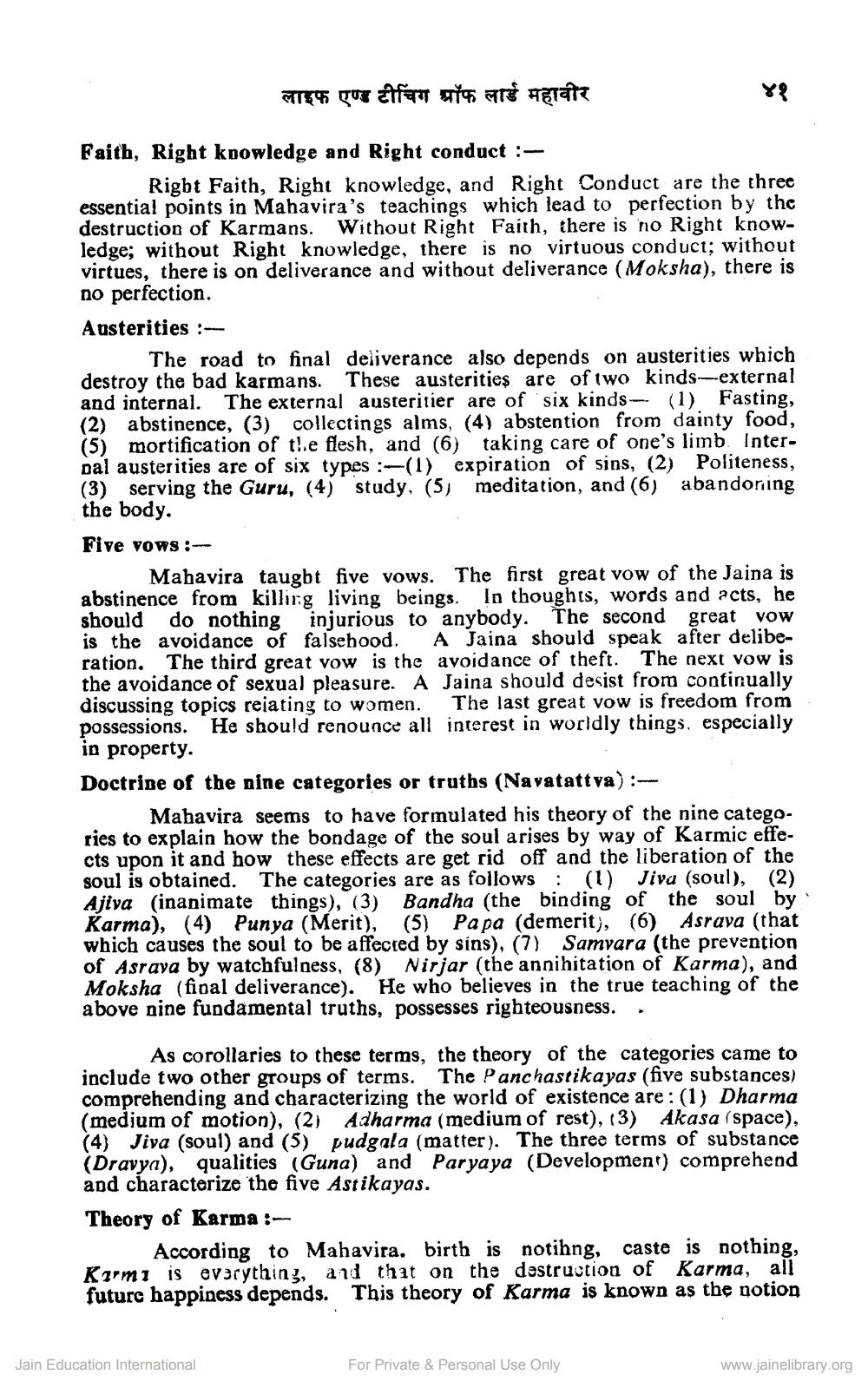________________
लाइफ एण्ड टीचिंग प्रॉफ लार्ड महावीर
Faith, Right knowledge and Right conduct :
Rigbt Faith, Right knowledge, and Right Conduct are the three essential points in Mahavira's teachings which lead to perfection by the destruction of Karmans. Without Right Faith, there is no Right knowledge; without Right knowledge, there is no virtuous conduct; without virtues, there is on deliverance and without deliverance (Moksha), there is no perfection. Austerities :
The road to final deliverance also depends on austerities which destroy the bad karmans. These austerities are of two kinds--external and internal. The external austeritier are of six kinds -- (1) Fasting, (2) abstinence, (3) collectings alms, (4) abstention from dainty food, (5) mortification of the flesh, and (6) taking care of one's limb. Interdal austerities are of six types :-(1) expiration of sins, (2) Politeness, (3) serving the Guru, (4) study, (5) meditation, and (6) abandoning the body. Five vows:
Mahavira taugbt five vows. The first great vow of the Jaina is abstinence from killirg living beings. In thoughts, words and acts, he should do nothing injurious to anybody. The second great vow is the avoidance of falsehood. A Jaina should speak after deliberation. The third great vow is the avoidance of theft. The next vow is the avoidance of sexual pleasure. A Jaina should desist from continually discussing topics reiating to women. The last great vow is freedom from possessions. He should renounce all interest in worldly things, especially in property. Doctrine of the nine categories or truths (Navatattva) :
Mahavira seems to have formulated his theory of the nine categories to explain how the bondage of the soul arises by way of Karmic effects upon it and how these effects are get rid off and the liberation of the soul is obtained. The categories are as follows: (1) Jiva (soul), (2) Ajiva inanimate things), (3) Bandha (the binding of the soul by Karma), (4) Punya (Merit), (5) Papa (demerit), (6) Asrava (that which causes the soul to be affected by sins), (7) Samvara (the prevention of Asrava by watchfulness, (8) Nirjar (the annihitation of Karma), and Moksha (final deliverance). He who believes in the true teaching of the above nine fundamental truths, possesses righteousness..
As corollaries to these terms, the theory of the categories came to include two other groups of terms. The Panchastikayas (five substances) comprehending and characterizing the world of existence are: (1) Dharma (medium of motion), (2) Adharma (medium of rest), (3) Akasa (space), (4) Jiva (soul) and (5) pudgala (matter). The three terms of substance (Dravya), qualities (Guna) and Paryaya (Development) comprehend and characterize the five Astikayas. Theory of Karma :
According to Mahavira. birth is notihng, caste is nothing, Karmi is everything, and that on the destruction of Karma, all future happiness depends. This theory of Karma is known as the notion
Jain Education International
For Private & Personal Use Only
www.jainelibrary.org




